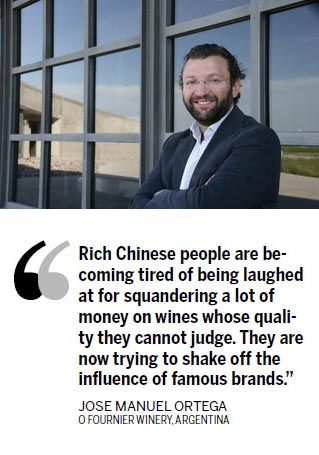
Entrepreneur selling small plots to those who want to produce their own brand
To own a vineyard, grow some grapes and make a few bottles of wine with personally designed labels sounds exotic to people leading busy lives in bustling Chinese cities. But Spaniard Jose Manuel Ortega, owner of the O Fournier winery, located in the Uco Valley area of Argentina's winemaking region Mendoza, is trying to make it possible.
|
 |
At an altitude of 1,100 meters above sea level, the winery is selling plots from one hectare to three hectares each at a price of $150,000 a hectare to wine lovers interested in investing in their own vineyards. The current package offers a total of 140 hectares, planted with Malbec and other varietals. It allows for a maximum of 85 buyers.
This price is about three times the current price of a vineyard in Argentina by book value.
In reality, holding one hectare of vineyard with all the necessary irrigation facilities will cost much more, ignoring the fact it is impossible for individual investors to buy such a small vineyard any other way because plots on offer are usually far bigger, Ortega said.
The package will give them access to the winery's facilities, so they can make personal blending, design their own customized labels and even ship wines to their home country.
Once the plot is bought, the winery will take care of the daily maintenance work. Buyers can pay for the services by selling the harvested grapes and wine to the winery. This means buyers do not need to spend more money on the plots and could instead expect some return, Ortega, 44, said.
There is one especially good thing about the package, Ortega said: "You don't need to be super rich to own a vineyard in Argentina's Uco Valley."
Daniel Pita, a hedge fund lawyer from Sao Paulo, said in a report in Bloomberg Businessweek: "The Uco Valley is producing not just the best wines in Argentina but some of the best in the world."
"If you look at other regions that are famous for good wine, like Bordeaux and Napa, you can't even think about investing there." Pita added. He invested in the Ortega package without having visited Mendoza, according to the report.
A former investment banker at Goldman Sachs Group Inc, Ortega left the financial business in 2004. During his years in the winemaking industry, he has traveled frequently between China and Latin America and developed a profound understanding of the Chinese market.
"Rich Chinese people are becoming tired of being laughed at for squandering a lot of money on wines whose quality they cannot judge," Ortega said. "They are now trying to shake off the influence of famous brands."
Ortega also noticed that wines are closely associated with social status in China. "To show the guests a bottle with a personal label, rather than just a bottle of expensive wine, is certainly more appealing," Ortega said.
He also said he plans to set up web cameras for each plot, so owners can watch and show their friends what is going on in their vineyards on the other side of the world with just a few clicks of the mouse.
So far no Chinese buyers have approached Ortega to join the program. "But I believe they will be interested," Ortega said.